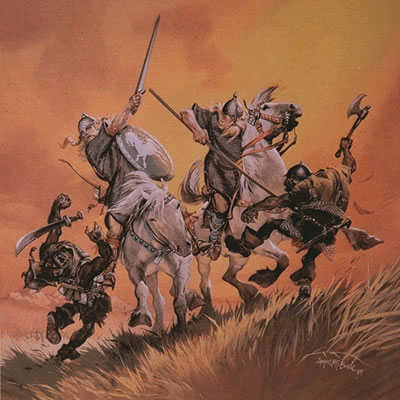“…with bright-gold helmet, breastplate and ring…” (Tollers would have loved this…)
Friday, September 25, 2009
posted by Deuce Richardson
 Print This Post
Print This Post
One of the most significant archaeological discoveries ever made on British soil was announced this week. The news? An amateur treasure-hunter in western Staffordshire recently discovered an Anglo-Saxon hoard of unprecedented size and richness. The location of the “Staffordshire hoard” (dated to the half-century betwixt 675 and 725AD) places it within the north-western boundaries of the Dark Age Saxon kingdom of Mercia.
J.R.R. Tolkien was deeply interested in the history of Mercia. He traced his maternal (and much of his paternal) line back to that realm. Tolkien spent almost all of his childhood within the bounds of the now-vanished kingdom. He is known to have stated that he felt a sense of instant familiarity and kinship with the distinctive Mercian dialect of Old English when he first encountered it, early on in his philological studies. A good deal of The Book of Lost Tales was localized within what was Mercian territory. He even seems to have believed that Beowulf, possibly the one work of literature closest to his heart, was composed in Mercia at roughly the time that the “Staffordshire hoard” seems to have been inhumed.
Mercia itself ought to be known in some degree by anyone who is familiar with Tolkien’s legendarium. It can be seen, in a very fantasticated form (in much the same way that REH’s envisioning of medieval Ireland resembles Hyborian Age Cimmeria) in The Lord of the Rings. Namely, Rohan; or, as the Eorlingas themselves called it: the Riddermark. Riddermark. “The ‘Mark’ of the Horsemen.” The word “mark” in this instance is derived by JRRT from the Anglo-Saxon word “mearc” (the basis, ultimately, for the name, “Mercia”) which is itself sprung from an even older term for “line or boundary.” By linguistic extension, that noun in Anglo-Saxon came to mean “border” or “frontier” (though only its more common and primal sense survived into modern English). Words such as “marquis,” “Denmark” and “march” (as in the sense of a “Bossonian March”) fossilize this archaic meaning like ancient beasts in amber.

Another synonym for “mark” (or “Mercia,” which is the Latinized version of the name) might be “sword-land,” i.e., “land won by the sword.” That is precisely what both Mercia and the Riddermark were. Mercia was hewn out of the Cymraeg body politic. The Riddermark was won in a Catalaunian fashion and maintained by edge of sword and point of lance in despite of the wishes of the dispossessed (and vaguely Celtic) Dunlendings. “Rider” and “raider” are close linguistic cousins, as Tolkien knew quite well. Mercia was the “Wild West” of Dark Age Angle-land, with “Injun Country” lying just on the sunset-ward side of Offa’s Dyke.
So, who were these “Mercian raiders” who buried the “Staffordshire hoard”? Why was such a treasure never recovered? Just imagine if it was found in 1930. What yarn might Robert E. Howard have spun out of it? Maybe a falling-out amongst the reavers. Perhaps the owners of the loot were annihilated by a creature of the Outer Dark, summoned by a vengeful sorcerer. A puzzle begging for a dark and bloody solution.
The ultimate provenance of the “Staffodshire hoard” is one hell of a mystery, no matter how you parse it; and Mystery is an essential element in almost any tale worth telling.
*Art by Angus McBride
BRIAN ADDS: Thanks for the heads-up on this, Deuce. Anyone who’s remotely interested in Anglo-Saxon history and the Dark Ages should be excited by this find. The pieces in that hoard are gorgeous.
